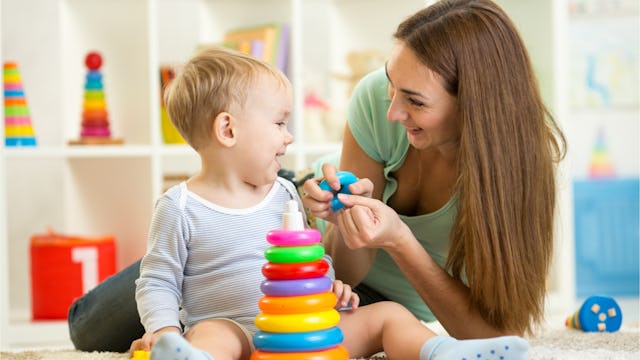If You Micromanage Your Kids' Playtime, You Need to Take a Seat

I’m bored — those are the two words that every parent dreads hearing. Innocently enough, we begin to make suggestions about what our kids can do with their playtime. “Why don’t you color?” “Let’s read a book!” “Want to go outside?” “Play-Doh?” Pretty soon, we have completely taken over their playtime. We don’t allow them any time to come up with their next step or their own ideas organically because we are so hell-bent on being their Boredom Director. If this sounds like you, you need to take a step back.
Think of it this way: If you go to the beach or a pool, does the lifeguard sit in the chair and watch you, or do they get in the water with you and tell you how to swim? They sit in that big, high chair and watch you to make sure you don’t drown. That’s what we need to be doing with our kids while they play. Sit in the big chair, be their lifeguard, and make sure that they don’t drown (or choke on a toy or hurt themselves or something). You’d be amazed at how much more enjoyable playtime will become for both of you. Seriously.
Stepping back and letting them explore their own creativity is the best thing you can do for a kid. You know why? Because you are letting their individuality take the wheel and drive their actions. This is especially true for kids who already have active imaginations.
If your kid doesn’t have a particularly strong sense of imagination or isn’t much of a self-starter, invite them into a few activities you think they might enjoy and leave them the hell alone. That’s not to say that if they ask for ideas or feedback, you don’t engage them, but step back and let them come to you.
I found myself falling into this trap with my toddler son. It’s an easy one to fall into. I’d sit with him on the floor and hand him toy after toy as soon as he seemed to show a lack of interest in whatever was currently in his hands. Stacking rings? Keys? Book? Trains? I tried to stay one step ahead of him and anticipate his every move so that I could stave off the whining. Eventually, I realized that I was the one doing the playing, and he was simply going through the motions and getting no enjoyment from the exchange. That’s when I realized that I needed to chill out and just let him play the way he wanted to.
Now that I’ve parked my helicopter, my son enjoys independent playtime and is well-versed in coming up with his own ideas, games, and rules. This is because I have given him the space to play his way rather than my way. I can give him some art supplies, or a puzzle, or some random toys, and leave him be while I get things done around the house or work on my computer.
I hear all kinds of whacky things coming from the floor where he’s playing, but it’s all him. None of it has been directly influenced by my opinions on what he should be doing with his time. Granted, if he’s getting a little out of control (he is coming off a very big toy gun thing), I may direct his play in a new direction, like, “Hey, where did your favorite puzzle go?” or “Can you draw me a picture of your favorite animal?” But if he doesn’t take my suggestion, I ride it out. He may have a bigger plan at play, and I just need to let him get there on his own.
It’s easy to fall into the routine of playing for your kids instead of playing with your kids. We naturally want to keep them happy and entertained, but micromanaging them is not the way to go about it. We micromanage so many other parts of their lives, shouldn’t their playtime just be for them? If we’re telling them what to eat, when to go to bed, when to take a bath, when to clean up, don’t they ever get a chance to decide what to do with their time? Playtime should be that time. Kids need to know that we trust them to make their own decisions and also be resourceful with their time and energy. Giving them that kind of space can be hard, absolutely, but it’s invaluable to their growth and development.